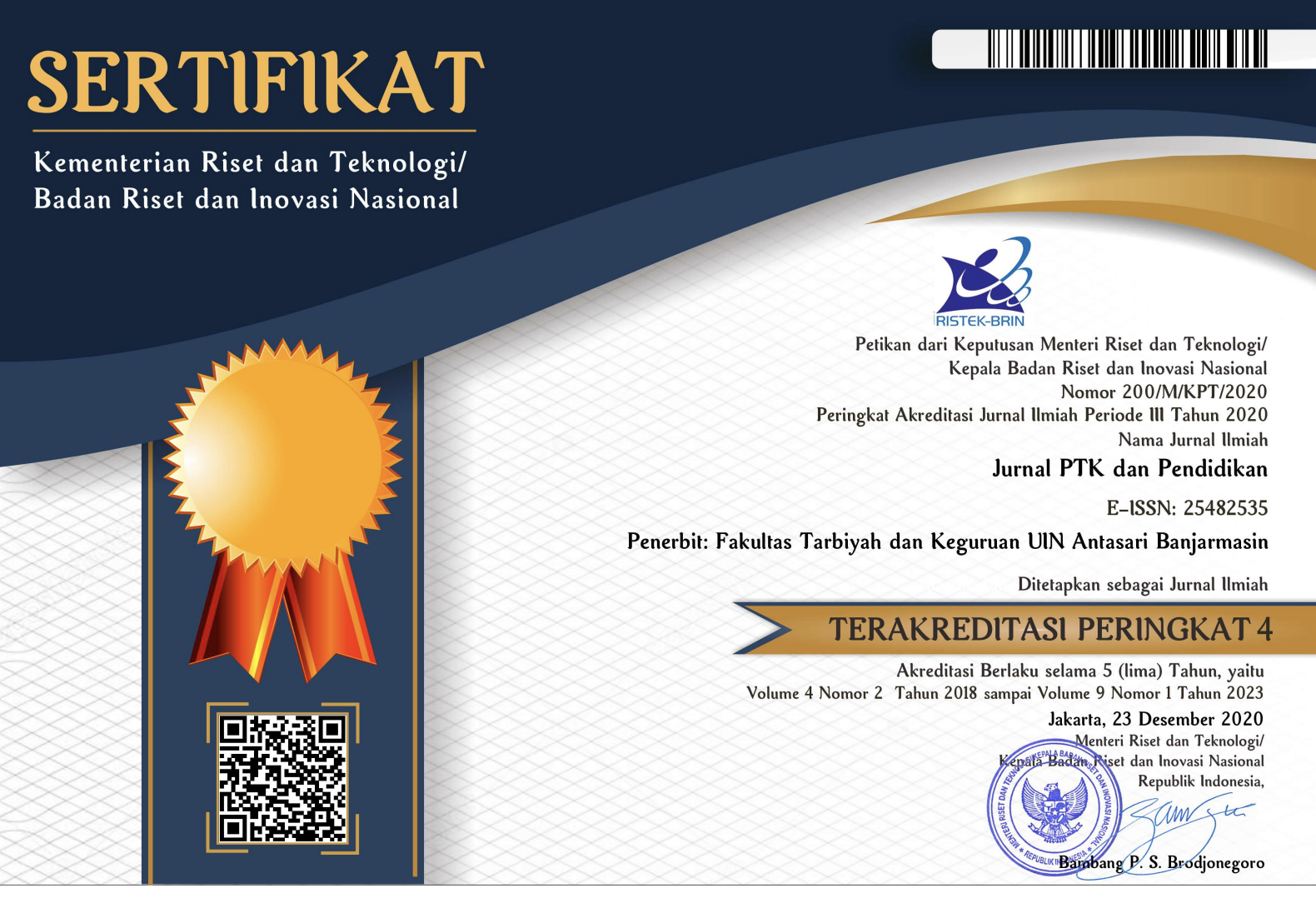EFEKTIVITAS MODEL PEMBELAJARAN DISKUSI KELAS STRATEGI BEACH BALL TERHADAP HASIL BELAJAR IPA PESERTA DIDIK
DOI:
https://doi.org/10.18592/ptk.v9i1.9621Abstract
Abstract: The cause of the low student learning outcomes is the learning process in the classroom which is still teacher-centered. The learning model that can increase student activity in class is the Beach Ball strategy class discussion model. The purpose of this study was to determine the effectiveness of the Beach Ball strategy class discussion model on science learning outcomes for Grade VIII students on the subject of the human digestive system at SMPN 2 Kupang Tengah. The design used in this research is nonequivalent control group design. The results showed that the average student learning outcomes in the experimental class obtained a pretest score of 41.86 which increased to 80.31 after being given a posttest. Whereas in the control class the pretest score was 45.47 which increased to 74.11 after being given the posttest. Based on the results of the one-way Anacova test, a probability value (sig) of 0.000 is lower than the set value of 0.05. This shows that Ha (Beach Ball strategy class discussion model is effective on student learning outcomes) is accepted and H0 the Beach Ball strategy class discussion model is not effective on student learning outcomes) is rejected. Based on the results of data analysis, it can be concluded that the Beach Ball strategy class discussion model is effective on the learning outcomes of class VIII students at SMPN 2 Kupang Tengah.Keywords: Effectiveness, Class Discussion, Beach Ball, Learning Outcomes, Food DigestionAbstrak: Penyebab rendahnya hasil belajar siswa adalah proses pembelajaran di kelas yang masih berpusat pada guru. Model pembelajaran yang mampu meningkatkan keaktifan siswa di kelas adalah model diskusi kelas strategi Beach Ball. Tujuan penelitian ini adalah untuk mengetahui efektifitas model diskusi kelas strategi Beach Ball terhadap hasil belajar IPA siswa kelas VIII pada materi sistem pencernaan makanan pada manusia di SMPN 2 Kupang Tengah. Jenis penelitian yang digunakan adalah penelitian kuantitatif dengan metode Eksperimen Semu. Desain yang digunakan dalam penelitian ini adalah nonequivalent control group design. Hasil penelitian menunjukkan bahwa rata-rata hasil belajar siswa pada kelas eksperimen memperoleh nilai pretest sebesar 41,86 meningkat menjadi 80,31 setelah diberikan posttest. Sedangkan pada kelas kontrol nilai pretest adalah 45,47 meningkat menjadi 74,11 setelah diberikan posttest. Berdasarkan hasil uji anacova satu jalur diperoleh nilai probabilitas (sig) sebesar 0,000 lebih kecil dari nilai yang ditetapkan sebesar 0,05. Hal ini menunjukkan bahwa Ha (model diskusi kelas strategi Beach Ball efektif terhadap hasil belajar siswa) diterima dan H0 model diskusi kelas strategi Beach Ball tidak efektif terhadap hasil belajar siswa)ditolak. Berdasarkan hasil analisis data dapat disimpulkan bahwa model diskusi kelas strategi Beach Ball efektif terhadap hasil belajar siswa kelas VIII di SMPN 2 Kupang Tengah. Kata Kunci: Efektif, Diskusi Kelas, Beach Ball, Hasil Belajar, Pencernaan MakananReferences
Afisha, H. M., Jalmo, T., & Maulina, D. (2016). Pengaruh Model Problem Based Learning terhadap Kemampuan Berargumentasi dan Hasil Belajar Siswa. Jurnal Bioterdidik Wahana Ekspresi Ilmiah, 15(2), 1–23.
Farisi, A., Hamid, A., & Melvina. (2017). Pengaruh Model Pembelajaran Problem Based Learning Terhadap Kemampuan Berpikir Kritis Dalam Meningkatkan Hasil Belajar Siswa Pada Konsep Suhu Dan Kalor. Jurnal Ilmiah Mahasiswa (JIM) Pendidikan Fisika, 2(3), 283–287.
Fathoni, A., & Rinaningsih. (2014). Penerapan Model Pembelajaran Diskusi Kelas Strategi Beach Ball Pada Materi Ikatan Kimia Untuk Meningkatkan Rasa Percaya Diri Siswa. UNESA Journal of Chemical Education, 3(1), 134–141.
Fauzan, M., Gani, A., & Syukri, M. (2017). Penerapan Model Problem Based Learning Pada Pembelajaran Materi Sistem Tata Surya Untuk Meningkatkan Hasil Belajar Siswa. Jurnal Pendidikan Sains Indonesia (Indonesian Journal of Science Education), 5(1), 27–35.
Hasanah, M., & Fitria, Y. (2021). Pengaruh Model Problem Based Learning Terhadap Kemampuan Kognitif IPA pada Pembelajaran Tematik Terpadu. Jurnal Basicedu, 5(3), 1509–1517. https://jbasic.org/index.php/basicedu/article/view/968
Missa, H., & Boy Baunsele, A. (2021). Pembelajaran Quantum Teaching Terhadap Hasil Belajar Siswa Kelas Vii Smp Katolik Sint Aloysius Niki-Niki Kabupaten Timor Tengah Selatan. EduMatSains : Jurnal Pendidikan, Matematika Dan Sains, 5(2), 93–104. https://doi.org/10.33541/edumatsains.v5i2.2011
Putri, R. A., & Zulfah. (2018). Pengaruh Model Pembelajaran Problem Based Learning (Pbl) Terhadap Hasil Belajar Ipa Siswa Kelas V Sekolah Dasar Negeri 005 Gunung Malelo. Jurnal Review Pendidikan Dan Pengajaran, 1(1), 14–25. https://doi.org/10.31004/jrpp.v1i1.152
Supiadi & Julung. (2016). Pengaruh Model Problem Based Learning (PBL) terhadap Kemampuan Memecahkan Masalah dan Hasil Belajar Kognitif Siswa Biologi SMA. JPS (Jurnal Pendidikan Sains), 4(2), 60–64. https://doi.org/10.17977/jps.v4i2.8183. Jurnal Pendidikan Sains, 4(2), 60–64. http://journal.um.ac.id/index.php/jps/article/view/8183
Wulandari, R., Wardhani, S., & Nawawi, S. (2020). Pengaruh Model Problem Based Learning Terhadap Keterampilan Berpikir Kritis Siswa Materi Keanekaragaman Hayati. BEST Journal (Biology Education, Sains and Technology), 3(1), 45–53. https://doi.org/10.30743/best.v3i1.2435
Wulandari, T., Hodsay, Z., & Pramika, D. (2020). Pengaruh Model Pembelajaran Diskusi Kelas Tipe Beach Ball Terhadap Hasil Belajar Pada Mata Pelajaran Ekonomi. Jurnal Neraca: Jurnal Pendidikan Dan Ilmu Ekonomi Akuntansi, 4(1), 66. https://doi.org/10.31851/neraca.v4i1.4307
Downloads
Published
How to Cite
Issue
Section
License
Copyright (c) 2023 Hildegardis Missa

This work is licensed under a Creative Commons Attribution 4.0 International License.
- The right to publication of all journal material published on the Jurnal PTK dan Pendidikan website is held by the editorial board with the author's knowledge (moral rights remain the property of the author).
- The formal legal provisions for access to digital articles of this electronic journal are subject to the terms of the Creative Commons CC BY 4.0 DEED Attribution International (CC BY) license. This license enables reusers to distribute, remix, adapt, and build upon the material in any medium or format, so long as attribution is given to the creator. The license allows for commercial use.
- Printed and electronic published manuscripts are open access for educational, research and library purposes. In addition to these objectives, the editorial board shall not be liable for violations of copyright law.






